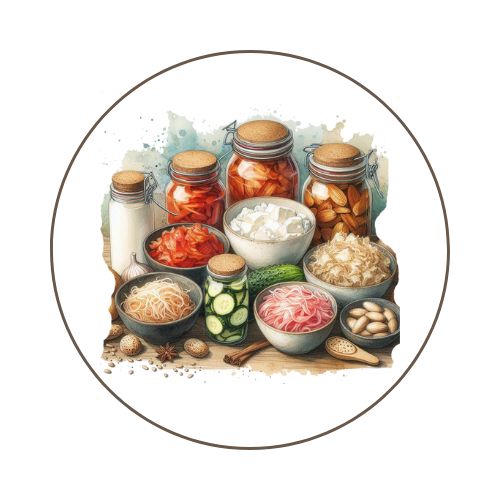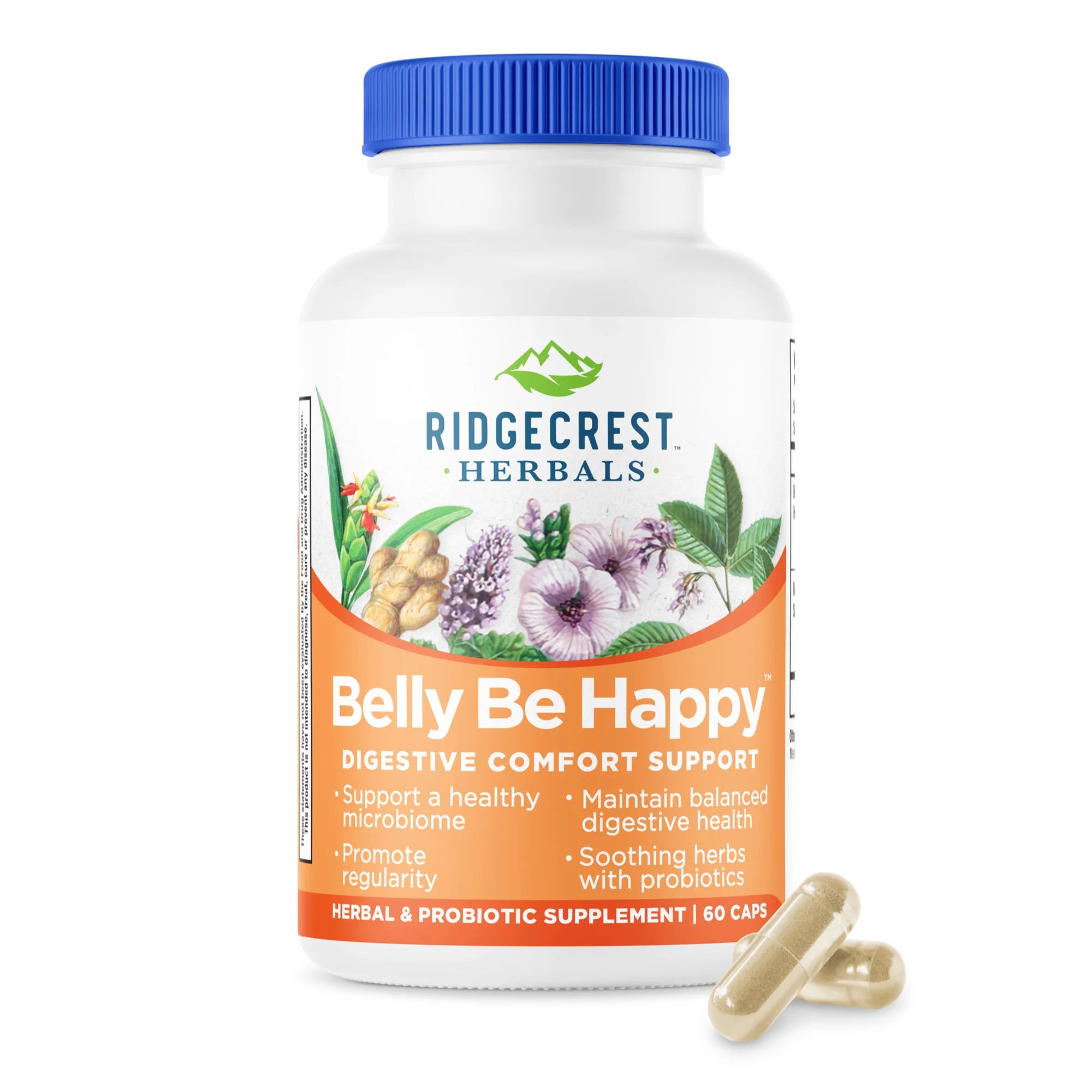Historically, fermenting foods was used to preserve foods for longer shelf life or to improve flavor. As a result, they've been a significant and beneficial part of many cultures' diets. However, it was when we started delving into the science behind why fermented foods are healthy that we understood the greater importance and impact nutritionally (Sanlier) (Parvez).
A fermented food is a food that has undergone a natural process in which microorganisms, such as yeast and bacteria, have converted carbs, such as starch and sugar, into alcohol or acids. The alcohol and acids act as a natural preservative, which is where their distinct tart flavor comes from. There are three main types of fermentation:
Lactic Acid Fermentation: yeast and bacteria process starches or sugars into lactic acid—examples: kimchi, pickles (salt, not vinegar), yogurt, and sourdough bread.
Ethyl Alcohol Fermentation: pyruvate molecules in sugars or starches are broken down by yeasts into carbon dioxide and alcohol—examples: wine and beer.
Acetic Acid Fermentation: starches and sugars from grains or fruits are fermented into sour substances. This process requires oxygen—for example: apple cider vinegar.
A number of health benefits are associated with eating fermented foods, especially considering they are often more nutritious than their unfermented form. So what are fermented foods good for, exactly?
Support Digestive & Immune Health
Fermentation allows for the growth of beneficial bacteria, known as probiotics. They benefit the immune system, digestive health, cognitive function, cardiovascular health, and much more. Evidence suggests that probiotics help soothe the digestive system, lessen the severity of diarrhea, bloating, gas, and constipation, and restore the balance of friendly bacteria in the gut (Glasziou) (Didari) (Hungin) (Guyonnet) (Dimidi) (Eales) (Guarino) (Miller).
For immunity, probiotics give the system a boost and help you recover more quickly from a weakened state of health (Galdeano C. and S.I.) (Zhang) (Ozen) (Wang) (Wu) (King) (Guillemard) (Vrese). And because fermented foods are rich in Vitamin C, iron, and zinc, all nutrients which play a key role in immunity, they contribute to building a stronger immune system (Vrese) (Maggini) (Hemila).
If you're looking for supplemental information on probiotics and the microbiome, I've written articles in prior editions of the Almanac, which are available, links at the end of the article.
Improves the Digestion of Foods
Fermentation breaks down the nutrients in food, allowing them to be more easily digested, which is particularly beneficial for those who struggle with nutrient absorption, digestive concerns, or have a limited diet due to restrictions.
For instance, those who struggle with gluten intolerance (not Celiac) often find they are able to eat foods made from sourdough. This is because the yeast in sourdough breaks down over fructan, phytic acid (an anti-nutrient), and gluten (Rizzello) (Cagno) (Gupta).
To compare, regular bread from the store contains around 124,000 ppm of gluten, whereas true sourdough contains up to 200 ppm of gluten. To be considered gluten-free by the FDA, the gluten content needs to be less than 20 ppm per serving. Note the bread has to be a true sourdough, traditionally made and fermented over 24 hours to achieve the above. Commercial yeast was genetically modified to decrease the time it took bread to rise (Biello) (Ceccato-Antonini) (Fraczek). Unfortunately, the cost of that was a yeast that lacks the ability to digest gluten, fructan, and phytic acid effectively, all components which can aggravate the digestive system.
The same applies to lactose intolerance. Because lactose is a natural sugar found in milk, it is broken down during fermentation into simpler sugars, glucose, and galactose. As a result, those of us with lactose intolerance are generally fine to eat fermented dairy products, like kefir, for example (Hertzler).
In addition, the byproduct of fermentation is the creation of new nutrients, such as B vitamins, omega-3 fatty acids, isothiocyanates, indole-3-carbinol, superoxide dismutase, GTF chromium, glutathione, phospholipids, digestive enzymes, and beta 1,3 glucans (Katz). Each of these nutrients has its own long list of health benefits.
Other Benefits
Brain health: we know now that gut health impacts cognitive function, including learning, memory, focus, and mood, largely due to the probiotics contained in fermented foods. In addition, many of the components in fermented foods have neuroprotective benefits (Kim) (Hilimire).
Weight management: a healthy gut microbiome consisting of certain strains of probiotics has been linked to a healthier weight and decreased belly fat (Le Roy) (Aoun). In addition, eating certain fermented foods, such as kimchi and fermented milk products, has demonstrated benefits for balancing blood sugar levels (Sivamaruthi).
Cardiovascular health: evidence also suggests fermented dairy foods positively impact heart health by helping balance cholesterol and blood pressure (Tapsell).
Fermented Foods To Include In Your Diet
Below are some of the fermented products you're most likely to find locally or even make yourself (which is highly encouraged). If you're interested in learning more, check out the book Wild Fermentation by Sandor Katz or check out our blog for some recipes!
| Sauerkraut | Aged cheese (check the label for active cultures) | Kimchi |
| Sourdough | Raw cheese (non-pasteurized - it kills the probiotics) | Kombucha |
| Yogurt | Cottage cheese (check the label for active cultures) | Kefir |
| Coconut kefir | Water kefir | Wild Soda |
| Tempeh | Miso | Pickles (in salt, not vinegar) |
| Natto | Raw apple cider vinegar | Kvass |
| Salami | Lassi |
Creme Fraiche |
| Worcestershire sauce (the real kind) |
|
About the Author
 |
Nichole Peterson Our Magical Marketing Millenial (AKA Marketing Director) has been our brand boss and marketing maestro since 2016. Nichole is behind building and maintaining our brand, trailblazing our marketing and advertising, innovating us into the future, and directing the marketing team with creativity. Nichole describes herself as a wilderness enthusiast, artist, bookwork, spiritual alchemist, and mother. Her favorite herbs are Eucalyptus and Elderberry and she proudly recommends our AdrenaLove®, IntelliGut®, PhysiQOL™, SinusClear®, ClearLungs® Classic, and ClearLungs® Liquid. |
Check out these related blogs and recipes:
- The History of Fermentation
- Brewing & Benefits of Kombucha
- Natural Yeast Facts
- Farmers Market Wild Soda
- Fermented Honey Garlic
- Ginger Bugs
- The Miraculous Microbiome
- The Gut-Brain Connection
Works Cited/References
Aoun, Antoine. “The Influence of the Gut Microbiome on Obesity in Adults and the Role of Probiotics, Prebiotics, and Synbiotics for Weight Loss.” NCBI, 30 June 2020, https://www.ncbi.nlm.nih.gov/pmc/articles/PMC7333005/. Accessed 3 April 2023.
Biello, David. “Baker's Yeast Gets a Genetic Makeover.” Scientific American, 27 March 2014, https://www.scientificamerican.com/article/bakers-yeast-gets-a-genetic-makeover/. Accessed 3 April 2023.
Cagno, Raffaella Di. “Sourdough Bread Made from Wheat and Nontoxic Flours and Started with Selected Lactobacilli Is Tolerated in Celiac Sprue Patients.” NCBI, February 2004, https://www.ncbi.nlm.nih.gov/pmc/articles/PMC348803/. Accessed 3 April 2023.
Ceccato-Antonini, Sandra Regina. “From baker's yeast to genetically modified budding yeasts: the scientific evolution of bioethanol industry from sugarcane.” Oxford Academic, 16 November 2008, https://academic.oup.com/femsyr/article/20/8/foaa065/6021367. Accessed 3 April 2023.
Didari, Tina. “Effectiveness of probiotics in irritable bowel syndrome: Updated systematic review with meta-analysis.” PubMed, 14 March 2015, https://pubmed.ncbi.nlm.nih.gov/25780308/. Accessed 3 April 2023.
Dimidi, Eirini. “The effect of probiotics on functional constipation in adults: a systematic review and meta-analysis of randomized controlled trials.” PubMed, 6 August 2014, https://pubmed.ncbi.nlm.nih.gov/25099542/. Accessed 3 April 2023.
Eales, Jacqui. “Systematic review and meta-analysis: the effects of fermented milk with Bifidobacterium lactis CNCM I-2494 and lactic acid bacteria on gastrointestinal discomfort in the general adult population.” PubMed, 10 October 2016, https://pubmed.ncbi.nlm.nih.gov/28286561/. Accessed 3 April 2023.
Fraczek, Marcin G. “History of genome editing in yeast - PMC.” NCBI, May 2018, https://www.ncbi.nlm.nih.gov/pmc/articles/PMC5969250/. Accessed 3 April 2023.
Galdeano C., Maldonado, and Cazorla S.I. “Beneficial Effects of Probiotic Consumption on the Immune System.” Karger.com, 16 November 2008, https://www.karger.com/Article/FullText/496426. Accessed 3 April 2023.
Glasziou, Paul. “A systematic review and meta-analysis: probiotics in the treatment of irritable bowel syndrome.” PubMed, 16 February 2009, https://pubmed.ncbi.nlm.nih.gov/19220890/. Accessed 3 April 2023.
Guarino, Alfredo. “Probiotics as prevention and treatment for diarrhea.” PubMed, January 2009, https://pubmed.ncbi.nlm.nih.gov/19114770/. Accessed 3 April 2023.
Guillemard, E. “Consumption of a fermented dairy product containing the probiotic Lactobacillus casei DN-114001 reduces the duration of respiratory infections in the elderly in a randomised controlled trial.” PubMed, 14 September 2009, https://pubmed.ncbi.nlm.nih.gov/19747410/. Accessed 3 April 2023.
Gupta, Raj Kishor. “Reduction of phytic acid and enhancement of bioavailable micronutrients in food grains.” PubMed, 24 April 2013, https://pubmed.ncbi.nlm.nih.gov/25694676/. Accessed 3 April 2023.
Guyonnet, D. “Effect of a fermented milk containing Bifidobacterium animalis DN-173 010 on the health-related quality of life and symptoms in irritable bowel syndrome in adults in primary care: a multicentre, randomized, double-blind, controlled trial.” PubMed, August 2007, https://pubmed.ncbi.nlm.nih.gov/17635382/. Accessed 3 April 2023.
Hemila, Harri. “Vitamin C for preventing and treating the common cold.” PubMed, 31 January 2013, https://pubmed.ncbi.nlm.nih.gov/23440782/. Accessed 3 April 2023.
Hertzler, Steven R. “Kefir improves lactose digestion and tolerance in adults with lactose maldigestion.” PubMed, May 2003, https://pubmed.ncbi.nlm.nih.gov/12728216/. Accessed 3 April 2023.
Hilimire, Matthew R. “Fermented foods, neuroticism, and social anxiety: An interaction model.” PubMed, 15 August 2015, https://pubmed.ncbi.nlm.nih.gov/25998000/. Accessed 3 April 2023.
Hungin, A P S. “Systematic review: probiotics in the management of lower gastrointestinal symptoms - an updated evidence-based international consensus.” PubMed, 20 February 2018, https://pubmed.ncbi.nlm.nih.gov/29460487/. Accessed 3 April 2023.
Katz, Sandor Ellix. “Wild Fermentation: The Flavor, Nutrition, and Craft of Live-Culture Foods.” Google Books, Chelsea Green Publishing, August 2016, https://books.google.com/books?id=oJG-DAAAQBAJ&pg=PA3&lpg=PA3&dq=As+microorganisms+go+through+their+life+cycles,+microbial+cultures+create+B+vitamins,+including+folic+acid,+riboflavin,+niacin,+thiamine+and+biotin.&source=bl&ots=gY1gednhQA&sig=ALLM33Smn44aX. Accessed 3 April 2023.
Kim, Binna. “A Review of Fermented Foods with Beneficial Effects on Brain and Cognitive Function.” NCBI, 31 December 2016, https://www.ncbi.nlm.nih.gov/pmc/articles/PMC5216880/. Accessed 3 April 2023.
King, Sarah. “Effectiveness of probiotics on the duration of illness in healthy children and adults who develop common acute respiratory infectious conditions: a systematic review and meta-analysis.” PubMed, 14 July 2014, https://pubmed.ncbi.nlm.nih.gov/24780623/. Accessed 3 April 2023.
Le Roy, Caroline. “Dissecting the role of the gut microbiota and diet on visceral fat mass accumulation.” NCBI, 5 July 2019, https://www.ncbi.nlm.nih.gov/pmc/articles/PMC6611773/. Accessed 3 April 2023.
Maggini, Silvia. “Selected vitamins and trace elements support immune function by strengthening epithelial barriers and cellular and humoral immune responses.” PubMed, October 2007, https://pubmed.ncbi.nlm.nih.gov/17922955/. Accessed 3 April 2023.
Miller, Larry E. “Effects of probiotic-containing products on stool frequency and intestinal transit in constipated adults: systematic review and meta-analysis of randomized controlled trials.” PubMed, September 2017, https://pubmed.ncbi.nlm.nih.gov/29118557/. Accessed 3 April 2023.
Ozen, Metehan. “Probiotics for the prevention of pediatric upper respiratory tract infections: a systematic review.” PubMed, 28 November 2014, https://pubmed.ncbi.nlm.nih.gov/25430686/. Accessed 3 April 2023.
Parvez, S. “Probiotics and their fermented food products are beneficial for health.” Journal of Applied Microbiology, April 2006, https://ami-journals.onlinelibrary.wiley.com/doi/full/10.1111/j.1365-2672.2006.02963.x. Accessed 3 April 2023.
Rizzello, Carlo G. “Highly Efficient Gluten Degradation by Lactobacilli and Fungal Proteases during Food Processing: New Perspectives for Celiac Disease.” NCBI, July 2007, https://www.ncbi.nlm.nih.gov/pmc/articles/PMC1932817/. Accessed 3 April 2023.
Sanlier, Nevin. “Health benefits of fermented foods.” PubMed, October 2019, https://pubmed.ncbi.nlm.nih.gov/28945458/. Accessed 3 April 2023.
Sivamaruthi, Bhagavathi Sundaram. “A Mini Review on Antidiabetic Properties of Fermented Foods.” NCBI, 13 December 2018, https://www.ncbi.nlm.nih.gov/pmc/articles/PMC6316541/. Accessed 3 April 2023.
Tapsell, Linda C. “Fermented dairy food and CVD risk.” PubMed, April 2015, https://pubmed.ncbi.nlm.nih.gov/26148916/. Accessed 3 April 2023.
Vrese, Michael de. “Probiotic bacteria reduced duration and severity but not the incidence of common cold episodes in a double blind, randomized, controlled trial.” PubMed, May 2006, https://pubmed.ncbi.nlm.nih.gov/16844267/. Accessed 3 April 2023.
Wang, Yizhong. “Probiotics for prevention and treatment of respiratory tract infections in children: A systematic review and meta-analysis of randomized controlled trials.” NCBI, 7 August 2016, https://www.ncbi.nlm.nih.gov/pmc/articles/PMC4979858/. Accessed 3 April 2023.
Wintergerst, Eva S. “Contribution of selected vitamins and trace elements to immune function.” PubMed, August 2007, https://pubmed.ncbi.nlm.nih.gov/17726308/. Accessed 3 April 2023.
Wu, Taixiang. “Probiotics for preventing acute upper respiratory tract infections.” PubMed, 7 September 2011, https://pubmed.ncbi.nlm.nih.gov/21901706/. Accessed 3 April 2023.
Zhang, Hong. “Prospective study of probiotic supplementation results in immune stimulation and improvement of upper respiratory infection rate.” NCBI, 12 March 2018, https://www.ncbi.nlm.nih.gov/pmc/articles/PMC5995450/. Accessed 3 April 2023.



Leave a comment
All comments are moderated before being published.
This site is protected by hCaptcha and the hCaptcha Privacy Policy and Terms of Service apply.